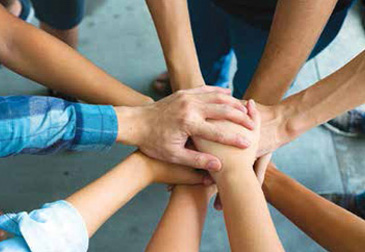We live in a world where “othering” or labeling some parts of humanity as “others” have become a way of life

Three weeks in the UK, US and Canada, shuttling from business to family to social commitments and the highlight of all this was listening to a powerful keynote by John Powell. John is the Director of the Haas Institute for a Fair and Inclusive Society at the University of California in Berkeley and his talk at the annual summit of Social Venture Partners in Vancouver set off a series of epiphanies among all of us who had the privilege to listen. His theme for a better world is built on “Othering and Belonging” and his words resonated, not just for the predominantly Caucasian white audience but many of us from Asia and African Americans and Latinos who found enough in our context for us to consider his thinking more seriously for our own lives.
We live in a world where “othering” or labelling some parts of humanity as “others” have become a way of life. We are all guilty in thought and action of looking at people, animals, and sometimes even the planet as others, which could either cause us harm or in some cases, need to be pitied and financially supported by us. While in some parts of the Western world, othering has led to decades of racial inequity, in India we are seeing inequities amongst social classes, caste, communities and even gender which have led to deep fissures in society. There is a power dynamic involved in othering that we have to pay deep attention to. It emerges from a tendency to view many others as “not like us” and a deep-rooted sense of superiority in who we are and what we represent. Even words like charity and inclusion are limiting in the sense that they start from an assumed position of the superiority of the person who wants to be good to the other. We need to free ourselves from this explicit or inherent tendency towards othering which is so embedded in our thinking and language that it becomes a limitation to what we can accomplish in a social context.
Sometimes we think, says John, that the way to deal with “othering” is “sameing”. When a well-known black author was offered a place in a predominantly white conference if “he did not bring any other riff-raff with him or flaunt his gay status in the face of the audience”, he politely declined saying he clearly did not belong. An offer of inclusion as a favor which starts with the belief that this is my house with rules and expectation already set and you are welcome to enter if you can act the same as I do implies that the rules have already been set. Belonging is not about feeling included or being invited into someone’s space it is about co-creating a new space where everybody belongs. The minute we realize that we are all people and there is no superiority in race, color, class or caste, the willingness to belong and extend the ability to belong will begin in our minds and make the world a more homogenous space. It is a space like this that Social Venture Partners is trying to create globally and certainly a “safe space” that we are trying to create in the city of Pune through our nationally and globally recognized Lighthouses of Pune initiative. We are experiencing the joy that comes only when the youth of a community feel empowered to dream, choose what they want to do and also the path to attain their goals.
‘Belonging’ is not about feeling included or being invited into someone’s space; it’s about co-creating a new space where everybody belongs
Another approach that visionaries like John have propounded in their model of true transformation also resonates with the kind of work we are doing in India through SVP. This is the ABC theory - Agency, Belonging and Change. The eco-system for a million sustainable livelihoods that we are trying to build in seven cities in partnership with over forty NGO partners encourages every potential beneficiary of our processes to build aspiration for their own success and develop a sense of belonging with the institution that is taking responsibility for providing them with the tools and skills to succeed. Finally, the change happens when all of us work together–primarily the host entity like the Pune Lighthouse or the Pan IIT Reach for India (PARFI) or any other NGO, the beneficiaries in every location, the enablers – academics, researchers, funders, and government agencies and the lead partners and enablers at SVP India. This is how one ensures the negation of any “othering” and a true sense of belonging in a co-created space that pervades the entire environment.
Finally, a thought. The four cabs we hopped into in Vancouver were all driven by immigrants from Punjab who had moved at the behest of a family member decades ago and brought most members of their extended families to Canada over the years. In the first Western cities where the Asian population crossed fifty per cent many years ago, one wonders who needs to belong – the Chinese, the Punjabis, the ethnic Canadians who still feel “othered” or the minority who constitute the majority of SVP Canada’s partners across Toronto, Calgary and Vancouver. Truly, we live in interesting times!
By Ganesh Natarajan